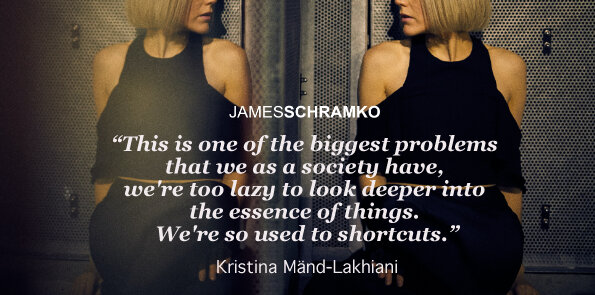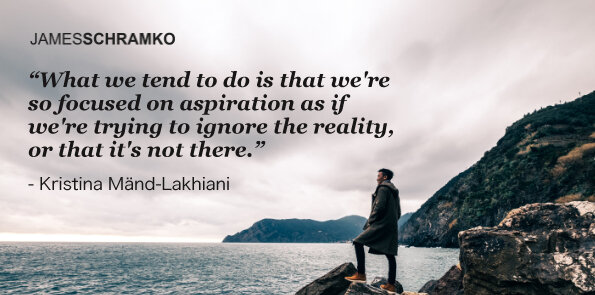Podcast: Download (Duration: 30:27 — 28.6MB)
Get Notified Of Future Episodes Apple Podcasts | Spotify | Amazon Music | Android | Blubrry | Gaana | TuneIn | Deezer | Anghami | RSS | More
While it is Kristina Mänd-Lakhiani’s first appearance on the show, she and James have had previous encounters at conferences in different countries, and have even shared meals.
Kristina, a co-founder of Mindvalley, is multifaceted in her roles as entrepreneur, writer, speaker, philanthropist, and mother. Her work within the personal transformation industry has influenced many, and today’s discussion on her book, Becoming Flawesome, follows the same vein of work on self improvement.
She and James discuss a common dilemma: whether to stick to your values or compromise in the name of success.
They talk about the destructive combination of perfectionist symptoms with a lack of self-belief.
And they explore the ultimate importance of self love in personal growth and fulfillment.
Table of contents:
1. Self help in the Russian market
2. Success versus authenticity
3. The dragons you can’t vanquish
4. The dark side to personal growth
5. Are you a Hermione?
6. The only love that matters?
Self help in the Russian market
Kristina Mänd-Lakhiani was a co-founder of Mindvalley from its beginning 20 years ago. However, she worked in the Russian market until just recently, and so is fairly new to the English-speaking audience, which surprises those who have just become acquainted with her work.
Is it true, asks James, that in Russian there weren’t some of the actual words to describe self-help?
Until now, acknowledges Kristina. The linguistic challenge, in fact, extends to translating the title of her new book, “Becoming Flawsome,” into Russian, something they haven’t yet worked out.
Reflecting on her experiences, Kristina likens herself to Don Quixote, fighting windmills while trying to translate and convey certain concepts to the Russian market. In essence, she says, people everywhere are the same, but background does influence one’s perception of things.
Kristina started her book in Russian due to her established networks there, but ultimately decided to write it in English, marking a shift towards a more global audience.
Success versus authenticity
Says Kristina, writing her book has been a journey of authenticity in itself. She initially thought to self-publish and retain control over the contents and presentation of her work, which she describes as an exploration of self-truth and personal discovery.
Kristina later reflected, however, that she wanted her “book baby” to have the best possible start, which led her to seek a publisher.
The effort to balance authenticity and wide distribution led to a nuanced dance for Kristina of preserving her book’s essence while catering to publishers’ demands. The book did undergo massive edits, however, including the removal of her favorite chapter.
This dilemma, whether to stay true to her values or compromise for a chance at success, reflects a common experience – individuals are often told to change aspects of themselves to succeed in various fields.
In the end, Kristina found a balance, declining almost all suggested changes after part two of her book. This decision was, surprisingly, accepted by the publishers.
This demonstrates, says Kristina, that there may be more room for authenticity than we assume, even within frameworks of success.
The dragons you can’t vanquish
In her book, Kristina uses the term “dragons” to symbolize personal flaws, weaknesses, or traumas that one might think detract from their worth or potential. These “dragons” can lead to feelings of inadequacy, doubt, and unprofessionalism.
Kristina posits that while these perceived flaws can make one uncomfortable, they are integral to one’s identity, and trying to vanquish them completely may result in losing an essential part of oneself.
How does this apply to something like physical appearance versus harmful habits, such as smoking? Kristina clarifies that she does not advocate damaging habits, but rather encourages acceptance of one’s inherent qualities.
For instance, while it’s okay to recognize that one gets angry easily, this doesn’t give them a free pass to be rude or hurtful.
Staying true to oneself, says Kristina, should not involve disrespect. A person’s responses to the world should ideally come from personal values, not just natural inclinations – it’s essential and proper to separate instinctual urges from one’s actions.
Self-love should not be taken as a license for harmful behavior. Too often, Kristina says, people misinterpret ideas that require deeper thought. Understanding something like self-love requires delving into its essence rather than skimming the surface.
The dark side to personal growth
As a personal development expert, Kristina recognizes that personal growth is not all positive; there are negative sides to it as well. Like other sectors, personal development comes with its fair share of traps and potential downfalls.
Kristina says that any quality or emotion, when taken to an extreme, can be destructive. This applies to a range of emotions and aspects of life, including religion and primary education.
The pursuit of perfection, for instance, a common theme in personal development, can lead to problems. People might set an ideal image of what they want to be and strive to achieve it, disregarding a significant gap between reality and aspirations.
This discrepancy, she argues, can lead to internal conflict, as people aren’t usually equipped to deal with the disappointment of not reaching their ideal selves. It can lead to a kind of self-deception, where people deny or hide their perceived flaws.
James shares a practical example of this in a business context. People often come to him with the goal of making $10 million a year, despite a massive gap between their capabilities or reality and their ability to achieve this goal.
Even when they do make $10 million, they often find themselves unhappy, wishing for simpler times. This highlights the importance of introspection and understanding oneself as part of personal growth.
Kristina debunks the idea that focusing on an aspirational image of perfection will make you a better person. She uses the analogy of a navigation system in a car, stressing that transformation can only happen when you know and accept your current position.
Trying to ignore or deny reality is unproductive and ultimately prevents growth. It’s about taking responsibility, owning up to reality, acknowledging your current state and consciously working towards your goals.
Are you a Hermione?
James and Kristina discuss the concept of the “Hermione syndrome,” which Kristina has coined to describe a combination of perfectionism and impostor syndrome. She estimates that about 80% of the audience might identify with this term.
The syndrome is characterized by the individual setting high standards for themselves, recognizing their strengths but having a low tolerance for failure and personal imperfections.
James agrees with the prevalence of this, especially among technically talented individuals who get stuck in their quest for perfection. People with this mindset, says James, might avoid taking on certain tasks that others accept with ease, potentially inhibiting their growth.
Such individuals might fear exploring new things, often letting their fear of failure stop them from venturing into uncharted territories.
Addressing this syndrome, Kristina says, is more about being aware of one’s tendencies than trying to “fix” them.
She also mentions that this leaning towards perfectionism often stems from society’s expectations that praise and love are rewards for good behavior. This mindset, learned from childhood, makes perfectionists afraid to fail as they equate it with losing love and respect.
The only love that matters?
On the topic of love, Kristina asserts that self-love is the only love that truly matters.
She argues that the way individuals perceive and value themselves influences their interactions with the world and how others treat them. There is research, in fact, indicating that individuals’ self-perception of worth can impact their salary expectations when applying for jobs.
Kristina suggests that individuals can command respect and admiration through their self-belief, influencing how others see them, Austin Powers being a humorous example. This concept relates back to the importance of self-love and self-worth.
Consider, says Kristina, that no one is obliged to love anyone else, including close family and friends. The only love one can reasonably expect is self-love, and while difficult to accept, this realization is vital for personal growth and happiness.
James praises Kristina’s passion and commitment to her work, as exemplified by her book.
Kristina wants to finish by saying that accepting and embracing one’s “dragons” or imperfections often leads to the discovery of personal strengths and contributions to the world. That’s a twist at the end of the journey.
James agrees. And he hopes they can have future chats, as he suspects there will be more books from Kristina.
If you’d like to read the whole of Kristina’s latest title, you’ll find Becoming Flawsome HERE, with three bonuses.
Liked the show? Leave us a review on iTunes











Leave a Reply